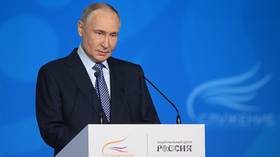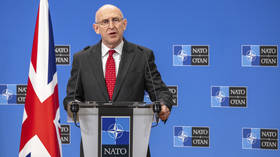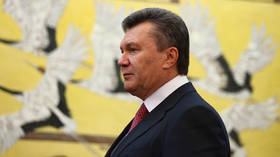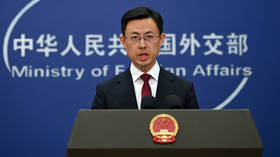Capitalism is way to nowhere – Immortal Technique
Corporations ‘are making too much money off of this stage of evolution, the capitalism, to stop and get off us to the next level’, the American rapper Immortal Technique said in an interview with RT.
The musician says the only thing that people are separated by is language and the inability to understand, that humanity has no other choice but to shift to a new economic idea doing away with devastating capitalism. But unfortunately people choose not to understand, he adds.
RT:When Hugo Chavez passed away you took to Twitter to discuss his leadership, his legacy. You clearly sparked some debate. No doubt that Chavez was a huge figure in South American politics. How do you believe his death will impact the continent?
Immortal Technique: When people talk about his death
leaving the country divided let me remind you that we live in a
very divided country right now. Mr Chavez earned the relationship
that he had with the US when he nationalized resources, when he
became a vocal critic of some of the overstepping of this country
[the US]. Now if any other country we do business with tries to do
the same thing, whether they are a country we have some sort of
relation with, or they are a client state, they are going to find
themselves in the same situation where their leader or anyone who
is responsible for making this sort of decisions is
demonized.
That being said, I think, even though Mr Chavez was a very inspirational figure especially in the Latino community it was during that time, I remind people, when Saddam Hussein had been toppled – fresh in people’s minds, when Afghanistan had been invaded, when there was talk of going into any other country and here was this upstart man saying ‘Mr Bush, you are an alcoholic, you are a donkey, you are coward, you will need your own troops if you get in your head to invade Venezuela I’ll meet you right here in this savanna’. You know, people hold all kinds of accusations at Mr Chavez. I heard people say that he was anti-Semitic. Anything they can do to defame him of not giving Israel a blank cheque shouldn’t be regarded as anti-Semitism. He in 2009 came and recognized the right of Israel to exist. That was downplayed in the news he added to that he acknowledged the right of Israel to exist but in existing it has to acknowledge the human rights of Palestinians as well. When you attach a statement like that to recognition I guess that in some people’s minds even the question that Palestinians are human beings or that they deserve the same rights as others is controversial.

The oil crisis that he created, he didn’t create it actually – there were several other factors that were involved in there, but other people were looking at it and thought how they could maximize their profits this quarter, and he simply decided to use the political capital and the economic capital that he had with his large oil reserves to make his ideas more popular in Latin America, which he succeeded in doing.
'Revolution an ongoing cycle'
RT:Do you think that Hugo Chavez’s project of
anti-imperial socialist South America is in danger without
him?
IT: I think it’s in danger with or without him. I think that interesting thing about him is that his great strengths are also some of his weaknesses. The idea that he would give this money and this good will to people, and he essentially gave away more money to Cuba and all of Latin America, than the US gave to Latin America probably with playing Columbia and he did, which is really frightening. I think that when Venezuelans look at it, I went down there twice, the first time in 2005 when they were very motivated and I saw people with revolutionary spirit of all walks of life and then returning again to see their economy on the decline 4-5 years later.
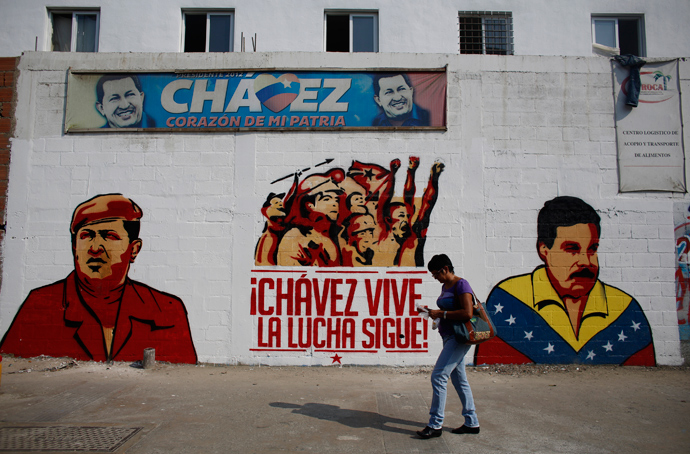
When examining all of these factors you can see the people of
Venezuela saying ‘We are glad that we are having good will towards
other countries, but what about our country?’ And that was one of
the biggest criticisms that I heard of him of his not investing
that capital that he built up to create a strong infrastructure
within Venezuela. I mean they are all the legitimate criticisms of
a man, he is not God. He was somebody who was in a position of
power, who decided to troll the US infinitely and very well in
fact, and really made his case in front of the rest of the world
and said a lot of things that they probably thought but didn’t want
to ruin their relationship with their foster daddy here.
RT:What do you think will be Washington’s next move in the region? Obama has already said that he wants to turn the page in relation between the two countries. Will Washington try to take advantage of the current situation?
IT: At the end of the day the US would like to have a government there that’s friendly to the US business. That wouldn’t be a bad thing if it didn’t mean that corporate needs and the profit margin of people that all have billions of dollars here in the US is going to be put before the lives of people who are working to create the foundation of that structure there. I’m not talking about the redistribution of wealth. And this is a funny point when people go off on that. ‘Wealth redistribution!’ You don’t seem to complain about wealth redistribution when it’s about poor people giving money to rich people. You know why? Because you wanna be those people. You complain about giving money to poor people because you don’t wanna be those people. That’s what it really is. It’s an emotional reaction to something selfish, what’s in the core of the deepest and darkest part of humanity. We all know that we have to pull resources. People redistribute water. Nobody owns all of it, why? Because that would be greedy.

When you look at what he actually was and what he was doing – he
was trying to create a more independent Latin American state. He
attempted that through the blueprint of the Bolivarian revolution.
Was he successful? To some degree, and to some degree not. Then
again Simon Bolivar’s vision was not completed either. He left out
huge factions of the society in Latin America. You know, African
people that were stolen and brought there to build Latin American
society. Indigenous people who were disenfranchised, who were
colonized, which is way too nice of a word for being raped and
genocided. When you look at that unfortunately it became the
transfer of power from peninsulares to criollos, and that permeated
racism in Latin America and classism as well. Even when we talk
about the original Simon Bolivar his vision was incomplete, so to
see Hugo Chavez passed before his vision would be complete is
simply a reminder that revolution is an ongoing cycle. It can’t be
centered around one man because that’s the recipe for
failure.
'Not a communist for fighting corporate power'
RT:This is clearly a good time for the opposition in
Venezuela to try to seize the opportunity to come to power.
Do you think they will get support from abroad?
IT: I think it’s likely and they’ve already got the support
from abroad. You see, coming to America is a necessity for Latin
American politicians to endure. They have to understand that this
huge empire that exists right above theirs, they have to get the
inner workings of it. Unfortunately, and I want to get it into
people’s minds, corporations will put the profit margin and will
put making money for billionaires over the lives and the quality of
life of foreign citizens. I don’t think it’s crazy for people to
fight against them, you are not a communist for fighting against
it. In fact, you resemble the greatest amount of spirit that any
American has ever had who fought for his rights and his dignity.
It’s ironic, because here in this country the profit margin is put
before people’s lives. Even the food that we eat, you know these
GMOs they don’t want their food's labeled.
RT:Even in Europe they do label foods for
GMOs.
IT: I think it’s an embarrassment too because they are
leaving out the pink elephant in the room. Their arguments don’t
align. It’s interesting because its repeated in history many times.
When Europeans first came to this continent, even Columbus’s
journey, people say: ‘oh, they were escaping religious persecution,
they were escaping anti-Semitism, they were escaping unjust laws’.
But they always leave out one of the main factors, and it’s so
embarrassing because this is a capitalist society, why they are
leaving it out. I now know why they are leaving this out. They came
here looking for money, for opportunity to take people’s life
because they weren’t considered human beings. They were considered
infidel by the church and therefore they were completely legal to
be subjected.
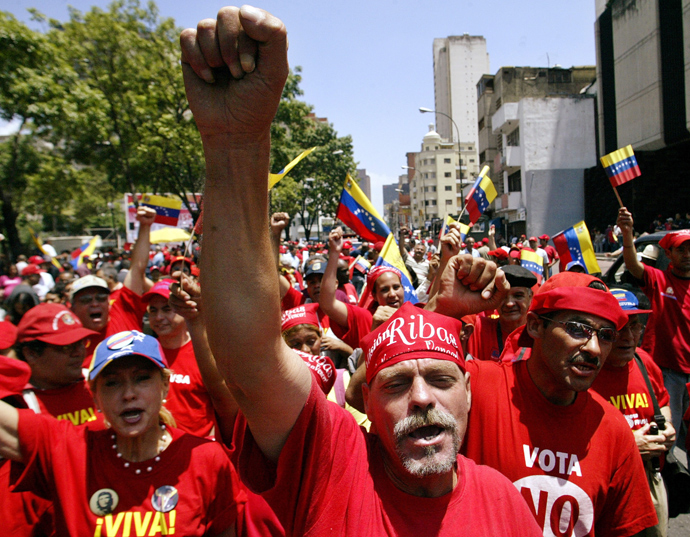
When you look at that perspective it teaches us to question what
is our place in society? And as Americans we may not like the image
of Chavez, even though we may disagree with what his perspectives
are wouldn’t we want our lives and our children’s lives to be put
over in consideration to some rich sleaze balls bottom line?
Everything that’s bad is completely legal for us and everything
that’s good is being clamped down claimed by some neo-liberal
authority so that they can repackage it and sell.
'Entrenched capitalism a nail in humanity's coffin'
RT:You have managed through a lot of hard work to
become an independent successful rapper. You’ve tried not to sell
out, not to sign your authority and decision-making away when it
comes to your own creativity. Is it becoming harder to maintain
that type of integrity in today’s music industry?
IT: Everybody who is going to recover out there knows that
when you get over the first few first years it gets easier. When
you are winding yourself off the industry cocaine and heroin,
because that’s essentially what they are, they provide things that
people get used to – budgets, sponsors. It makes it more difficult
when you have to put up the money and take the risk in the
investment yourself although the reward is much greater. If you are
actually reaping the benefits of that by setting it up in a
structured deal that is heavily in your favor. When you take the
majority of the risk and put the majority of the money so you are
taking out the majority of the profit, which is why we are scuffed
at the accusation of Marxism and communism.

I understand how this system functions as well. I
look at those things as being part of the building blocks of
humanity, they are stages of evolution that we are going through.
And unfortunately people are making too much money off of this
stage of evolution, the capitalism, to stop and get off us to the
next level, because if we are still here in a hundred years then
we’ll basically put a nail in a coffin for humanity to the point
where we can’t speak about healthy food without being persecuted by
the companies that sell food – that’s bad for you. They are making
too much money selling processed stuff that is going to be proven
to give people cancer in order to stop it and take it from the
market.
RT:How can it be stopped? Do you think it’s possible in
a country like the US, where it’s set up that way?
IT: I heard this debate a lot. What kind of crisis is it
going to take? Is it going to take a cataclysm that threatens all
of humanity for us to look at one another and say ‘It doesn’t
matter what color he is, or what religion she is?’ We are all human
beings and in order for us to kill one another we have to find
these horribly divisive tiny little things that we can expand and
make seem huge, while in reality we are simply separated by
language and the inability to understand because we choose not to
understand. The ability is perfectly there.
The statements, views and opinions expressed in this column are solely those of the author and do not necessarily represent those of RT.



